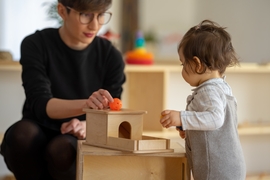
Parenting is one of the most rewarding and challenging roles we play as adults. Our society has high expectations of parents and yet we are not always able to access the resources we need to become the parent we want to be. Montessori can offer you a parenting framework from birth to maturity. It is more than an educational method; it is an approach to supporting the full development of your child.
The following is a list of some simple, yet effective ways in which adults can support the development of language of infants and young children.
Your earliest conversations
- Even a very young baby will invite you to communicate. He may reach out towards you with his hand, vocalise and make eye contact with you. You can respond by meeting his gaze. This can be tiring work for a very young baby and so he will take little breaks and then resume eye contact. When your young baby avoids making eye contact, this can be a sign that he is getting tired.
- You can hold a conversation with your young baby by repeating the sounds that he makes. This will encourage him to make more sounds.
Expressive communication (...when your child speaks)
- You might start to hear words in your baby’s babbling from eight months. The average age for a baby’s first understood word is 12 months. From this point, your baby will rapidly acquire vocabulary, building to around 50 words by around 18 months.
- Language develops through the child’s experience of language. Your child will speak the words that she hears. Providing a good model of language will mean that your child will have a greater chance of being widely understood when she expresses herself.
- Providing your child with the language labels for the things that she looks at, touches and takes an interest in, will support her absorption of the word.
- When your child uses a single word to convey meaning, offer it back to her in a full sentence relevant to the situation: e.g. your child says: ‘drink’; you say: ‘I would like a drink’.
Receptive communication (...when your child hears and understands)
- Babies are born with a preference for the human voice. They have already absorbed the patterns of their mothers’ voices during pregnancy and this provides reference points for them in their new world.
- Your baby will be sensitive to the emotion in your spoken language and by eight months will have begun to understand the meaning of certain words.
- While you work with your child during change times or during feeding, telling him about what you are doing and what will happen next, will enable him to participate as well as learn new words.
- The more language your child hears the more he will understand. A rich oral language is the best possible preparation for later writing and reading.
Things to Avoid
EAR INFECTIONS: These may affect your child’s hearing and language development. If you suspect an ear infection, it is important you go to the doctor.
SMOKING: Passive smoke can increase his chance of getting an ear infection (as well as many other health problems).



